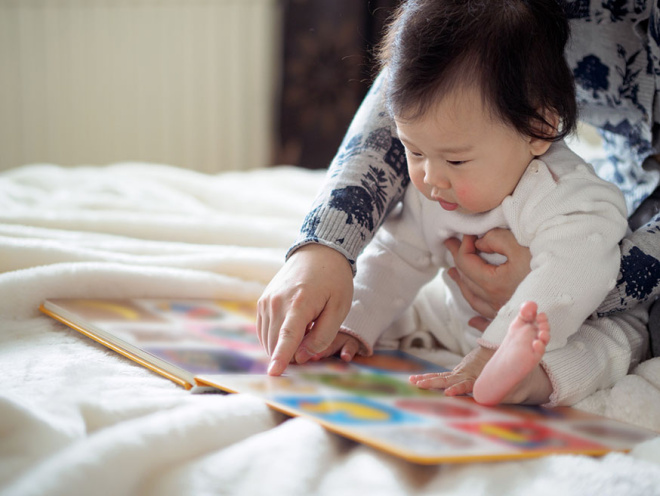Grab a coffee and get cosy because you’re about to get an excuse for a long sit-down. Here’s why reading to your child can be a great thing.
It expands their world, and maybe yours
Your child’s real day involves a trip to the supermarket and a visiting grandma. Their day once books are involved is a journey across the desert or a quick dash into space.
When it comes to children’s books, the horizons are ever expanding. Modern children’s books include those with a feminist slant, books about different family structures and child-friendly biographies of legends like Amelia Earheart.
A quick safari around the English language
Glance at most children’s books and you’ll see they incorporate tons of onomatopoeia words. These words sound like the thing they describe, like cuckoo or roar.
Many children’s books also rhyme and have a host of new vocabulary you might not use during your 11am toast break chat. All of this will hugely aid your baby’s speech development (Cates et al, 2017).
Helping with the tricky stuff
Navigating a toddler’s anxiety, worries and increasing awareness of their feelings in different situations is one of the biggest parenting challenges. Books are also great way of helping your child develop their understanding of others. Chosen wisely, books can be your best and most adaptable aids.
Getting to know each other
Some parents read to their babies while they’re in the womb as babies will become familiar with the sound of your voice (Fifer and Moon, 1998; Lariviere and Rennick, 2011). But whenever you start, reading has many benefits.
Books may become part of your family's routine. Your child describing the parts of the book they’re interested in is just as useful as sticking to it word for word. So do feel free to go for the creative approach.
There is a book for everyone
As a newborn’s eyesight develops, try a baby book with high-contrast images, then move to lift-the-flap books for curious toddlers. As they get older, introduce children’s books with progressively more text.
It’s all part of the training
The baby pawing at the book with a tiny fist or ripping the flaps will eventually curl up gripped by a beautiful children’s tale. (Choose books made with thicker card in the meantime.) It will likely happen when they first start primary school.
It lets everyone bond with them
Grandad might not be able to run around with a football because of his knee, and auntie Anna might know nothing about nappies. But what most people can do is pick up a children’s book. They’ll all bring their own style and teach your child something new.
It can even help them learn a second language
If you speak two languages at home – or simply want to learn Spanish for future holidays – then work that into your reading choices too. It’s great for your baby to practise using the sounds from both languages at a young age (Berens et al, 2013).
They’ll always come back to them – even if your baby has crawled away from this one 18 times…
Whether it’s a zumba class or work parties, we all have days where we don’t fancy something. So if they’re disinterested in reading, revisit it in a few days or mix up the story choices.
Just switching the time can work too. Children can be calmed by reading at night most of the time. Yet at certain developmental stages some can find them too stimulating.
If you’re struggling to get them interested again, children will always copy what you’re doing. Which might be the best reason we’ve ever heard to put your feet up and open that new book you’ve been meaning to read.
Further information
Our support line offers practical and emotional support with feeding your baby and general enquiries for parents, members and volunteers: 0300 330 0700.
You might find attending one of our NCT New Baby groups helpful as they give you the opportunity to explore different approaches to important parenting issues with a qualified group leader and other new parents in your area.
Make friends with other parents-to-be and new parents in your local area for support and friendship by seeing what NCT activities are happening nearby.
Check out this great resource for children’s books and find your nearest library to pick up some new children’s books here.
Berens MS, Kovelman I, Petitto LA. (2013) Should bilingual children learn reading in two languages at the same time or in sequence? Biling Res J. 36(1):35-60. doi: 10.1080/15235882.2013.779618. Available from: https://www.ncbi.nlm.nih.gov/pubmed/23794952 [Accessed 1st October 2017].
Cates C, Weisleder A, Dreyer B, Johnson M, Seery A, Canfield CF, Berkule J, Samantha, Mendelsohn, Alan L. (2017) Reading with children starting in infancy gives lasting literacy boost: Shared book-reading that begins soon after birth may translate into higher language and vocabulary skills before elementary school. American Academy of Pediatrics. Available from: http://www.readingrockets.org/research-by-topic/early-reading-matters-long-term-impacts-shared-bookreading-infants-and-toddlers [Accessed 1st October 2017].
Fifer WP, Moon C. (1988) Auditory experience in the fetus. In Smotherman WP, Robinson SR (Eds.), Behavior of the fetus 175-188. Caldwell, NJ. Telford Press. [Accessed 1st October 2017].
Lariviere J, Rennick JE. (2011) Parent picture-book reading to infants in the neonatal intensive care unit as an intervention supporting parent-infant interaction and later book reading. Journal of Developmental & Behavioral Pediatrics 32(2):146-152. doi: 10.1097/DBP.0b013e318203e3a1. Available from: https://www.ncbi.nlm.nih.gov/pubmed/21289497 [Accessed 1st October 2017].








